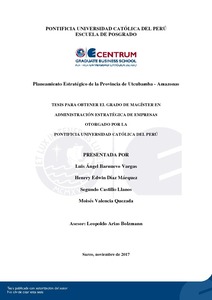| dc.contributor.advisor | Arias Bolzmann, Leopoldo Gabriel Ignacio | |
| dc.contributor.author | Barnuevo Vargas, Luis Ángel | es_ES |
| dc.contributor.author | Díaz Márquez, Henrry Edwin | es_ES |
| dc.contributor.author | Castillo Llanos, Segundo | es_ES |
| dc.contributor.author | Valencia Quezada, Moisés | es_ES |
| dc.date.accessioned | 2017-12-14T16:50:51Z | |
| dc.date.available | 2017-12-14T16:50:51Z | |
| dc.date.created | 2017 | |
| dc.date.issued | 2017-12-14 | |
| dc.identifier.uri | http://hdl.handle.net/20.500.12404/9851 | |
| dc.description.abstract | La provincia de Utcubamba, ubicada en la región Amazonas, tiene como pilares de su
movimiento económico el sector agropecuario, resaltando la producción de café, que
actualmente se realiza en pequeñas extensiones de tierra, por unidades familiares que
combinan este cultivo con otros y con la cría de animales para el autoconsumo. Es por ello
que se propone el desarrollo del cultivo de café orgánico, ya que se tienen las condiciones
climáticas necesarias. Por otra parte, Utcubamba presenta un conglomerado de atractivos
turísticos, los cuales no han sido explotados, principalmente por la falta de facilidades de
acceso y medios de promoción, que permitan ponerlo en valor y a disposición de los peruanos
y de los turistas extranjeros, como parte del circuito nororiental, aprovechando los recursos
ecológicos y arqueológicos que se tienen. En la visión para el 2030, se propone que
Utcubamba sea un referente regional, al tener un Índice de Desarrollo Humano superior a 0.5,
a través de la producción y exportación de café orgánico, al mismo tiempo que se desarrolla
la industria de turismo, con interconexión vial. Así se mejorará la oferta exportable y se podrá
aprovechar la apertura comercial que el Perú tiene hacia los mercados internacionales,
basándose en los Tratados de Libre Comercio que se han establecido. Asimismo, aprovechará
su riqueza natural para promover el turismo ecológico, a través de las facilidades de acceso
vial y de transporte, conservando su legado cultural e histórico, con respeto por el medio
ambiente, a través de acciones socialmente responsables por parte de la industria y la
población. De esta forma, los habitantes de Utcubamba gozarán de un mejor nivel de vida
con acceso a educación de calidad, nutrición y salud, capacitando a la mano de obra, lo cual
redundará en la mejora de los ingresos salariales, mediante los motores de desarrollo que
serán el turismo y la agro exportación | es_ES |
| dc.description.abstract | The province of Utcubamba, located in the Amazon region, has as its pillars its economic
movement the agricultural sector, highlighting the production of coffee which is developed in
small family crops among other products and combined with the breeding of animals for
autoconsumption. It is for this reason that the development of the organic coffee crop is
proposed, since the climatic conditions are necessary. On the other hand, Utcubamba presents
a conglomerate of tourist attractions, which have not been exploited, mainly by the lack of
access facilities and means of promotion, that allow to put it in value and at the disposal of
the Peruvians and the foreign tourists, as part of the northeastern circuit, taking advantage of
the ecological and archaeological resources that have. In the vision for 2030, it is proposed
that Utcubamba become a regional reference for its Human Development Index over 0.50,
developing organic coffee industry and tourism capacity, with road interconnection. This will
improve the exportable supply and will be able to take advantage of the commercial opening
that Peru has to the international markets, based on the free trade agreements that have been
established. It will also take advantage of its natural wealth to promote ecological tourism,
through the facilities of road access and transportation, preserving its cultural and historical
legacy, with respect for the environment, through socially responsible actions by industry and
the population. In this way, the inhabitants of Utcubamba will enjoy a better standard of
living with access to quality education, nutrition and health, training the labor force, which
will result in the improvement of wage income, through the development engines that will be
tourism and agro-export | es_ES |
| dc.language.iso | spa | es_ES |
| dc.publisher | Pontificia Universidad Católica del Perú | es_ES |
| dc.rights | info:eu-repo/semantics/openAccess | es_ES |
| dc.rights.uri | http://creativecommons.org/licenses/by-nc-nd/2.5/pe/ | * |
| dc.subject | Planificación regional -- Perú -- Amazonas | es_ES |
| dc.subject | Desarrollo regional -- Perú -- Amazonas | es_ES |
| dc.subject | Planificación estratégica | es_ES |
| dc.title | Planeamiento estratégico de la Provincia de Utcubamba - Amazonas | es_ES |
| dc.type | info:eu-repo/semantics/masterThesis | es_ES |
| thesis.degree.name | Magíster en Administración Estratégica de Empresas | es_ES |
| thesis.degree.level | Maestría | es_ES |
| thesis.degree.grantor | Pontificia Universidad Católica del Perú. CENTRUM | es_ES |
| thesis.degree.discipline | Administración Estratégica de Empresas | es_ES |
| renati.discipline | 413307 | es_ES |
| renati.level | https://purl.org/pe-repo/renati/level#maestro | es_ES |
| renati.type | https://purl.org/pe-repo/renati/type#tesis | es_ES |
| dc.publisher.country | PE | es_ES |
| dc.subject.ocde | https://purl.org/pe-repo/ocde/ford#5.02.04 | es_ES |






